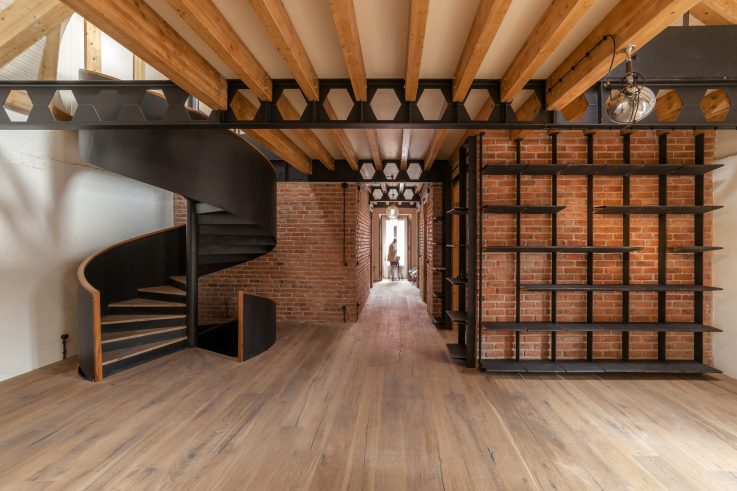
There is no material more diverse and timeless than brick – which can be seen as a staple in both ancient and modern architecture. In many cases, stripping away the drywall of a historical building can reveal beautiful brick walls, which bring a great deal of texture, warmth, and character into a living space. Whether left raw or painted, the look lends itself to a range of styles from rustic to industrial.
The following 5 projects exemplify how exposed brick can be used to evoke moments of textural advent in an apartment space.
Loft in Marvila / RA+TR Arquitectos
In 2017, RA+TR Arquitectos began their intervention in a two-story building where the ground floor was a former wine warehouse, and the upper floor contained two apartments. The advanced state of dilapidation of the existing structure made a complete demolition of the interior and the roof necessary.
In the reconstruction, the pre-existing roof and dividing floor remained but were given a different structure (wooden beams in the roof) which made it possible to free up space under the roof and add a concrete floor to separate the two stories.
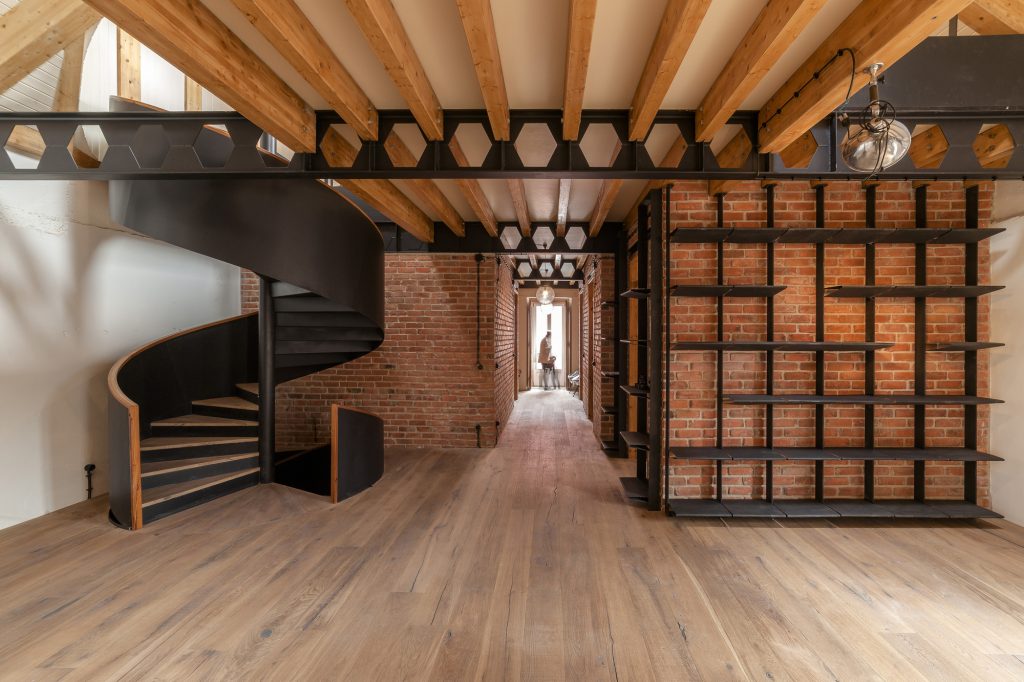
Making full use of the roof void and removing the dividing walls on the first floor – with the exception of those for a bedroom, the laundry area, and two bathrooms – provided a mezzanine, allowing for moments of openness through which to look down and observe the original brick and structure of the space.
The ground floor was kept spacious. The choice of materials ensured continuity with what existed before the intervention (lime mortars, woods, hydraulic tiles), in addition to providing a particular ambiance through their unique textures (iron, brickwork, wood) which speaks to the building’s industrial past.
JS Apartment / EB Arquitetos
In Cruzeiro Novo, Brazil, a segmented and dark old building unit was transformed into a warm and open-concept 46 square-meter apartment. The project, undertaken by EB Arquitetos, was slated to follow a very simple, efficient, and low-cost renovation plan.
EB Arquitetos removed the dividing walls of the kitchen and laundry area, as well as the narrow living room and one of the original bedrooms. The new kitchen – completely integrated into the living room and dining room – allows all of these spaces to be well-lit and ventilated at both ends. An abundance of light reaches all parts of the shared living space.

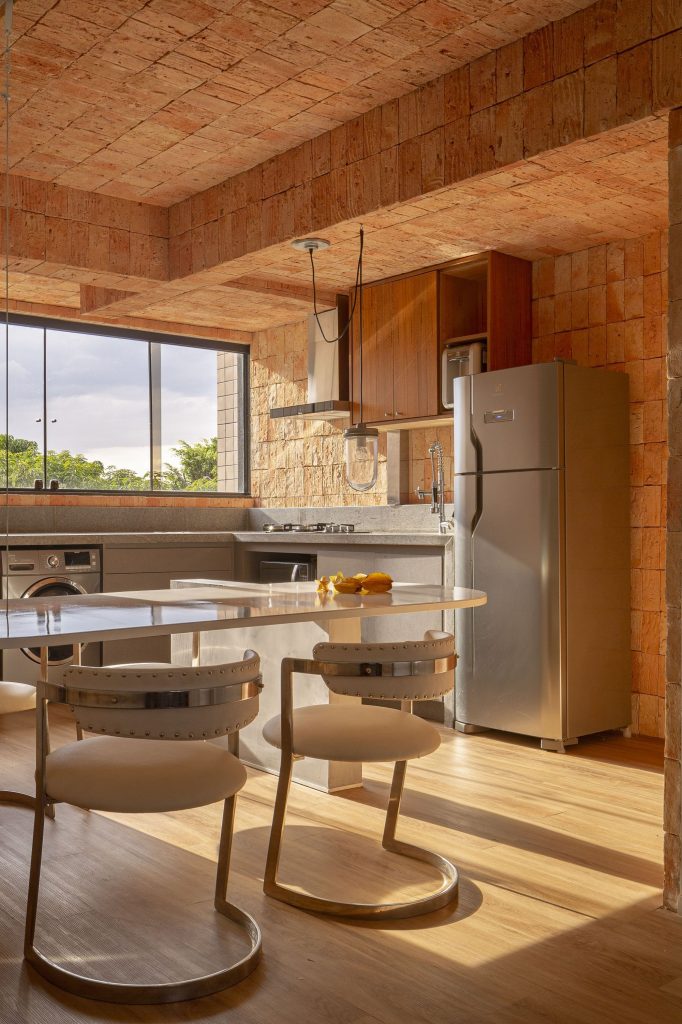
The central structural pillar was exposed in the original concrete, imparting a sense of character and the building’s original materials. Vinyl flooring was applied in all rooms, bringing unity and breadth. The kitchen, designed to be simple and functional, has a single countertop that extends along the peripheral walls (covered in rough brick), housing all of the equipment in the service area.
The same brick that covers part of the kitchen also makes its way to the ceiling slab and upper beam. A steel cable hangs down, supporting a suspended oblong metallic table – a tribute to the traditional tables of Brazilian bars.
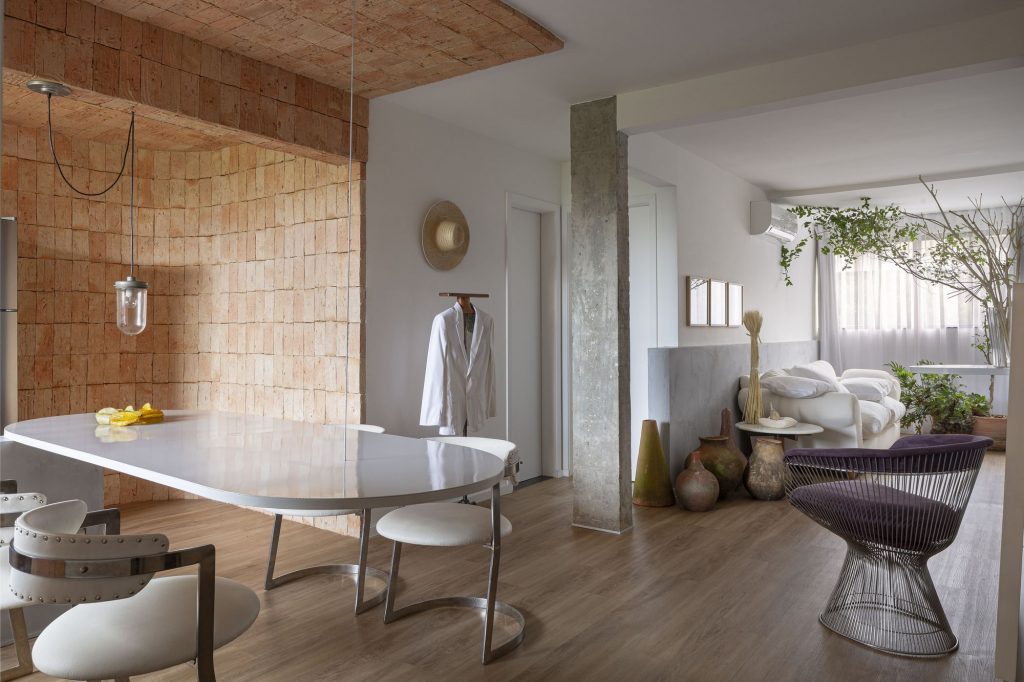
Kalanchevskaya Apartment / buro5
This apartment, located in Moscow, Russia, already had a fireplace and ceilings with a height of 420 cm before it collapsed in disrepair. The original structure was built in the pre-revolutionary period (a two-story building built in 1914) not far from the center of Moscow. In order to preserve this important history, all interior and stylistic decisions were built in the context of the original architecture of the building.
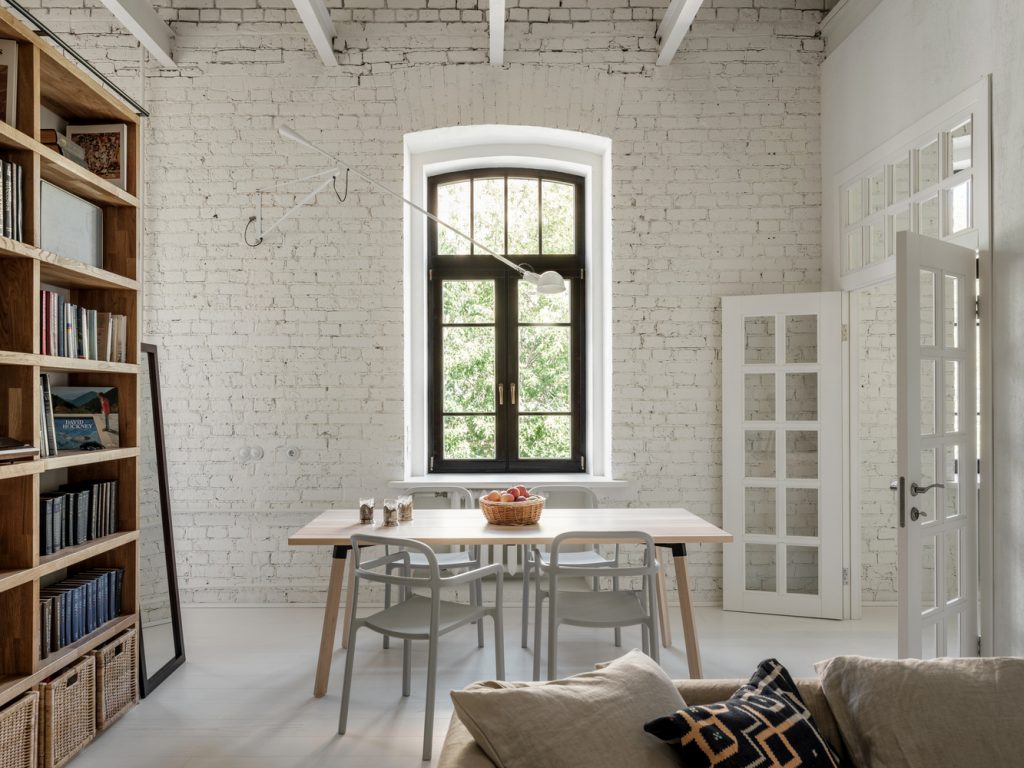
Features such as centuries-old wooden beams, metal I-beams, and mezzanine windows were uncovered in the restoration process. These pre-existing elements dictated a lot of the project’s design decisions. Although tedious, the process of conducting a full restoration was worth it, allowing for features such as a mezzanine pantry above the bedroom, and a mezzanine above the bathroom, as well as access to both through a library staircase.
Thanks to the height of the roof, the mezzanine window allowed for the small space to be flooded with light. Such design decisions and the amount of natural light (which is unusual for Moscow) is reminiscent of a Mediterranean home, evident in the stylistic choices of color and furnishings.
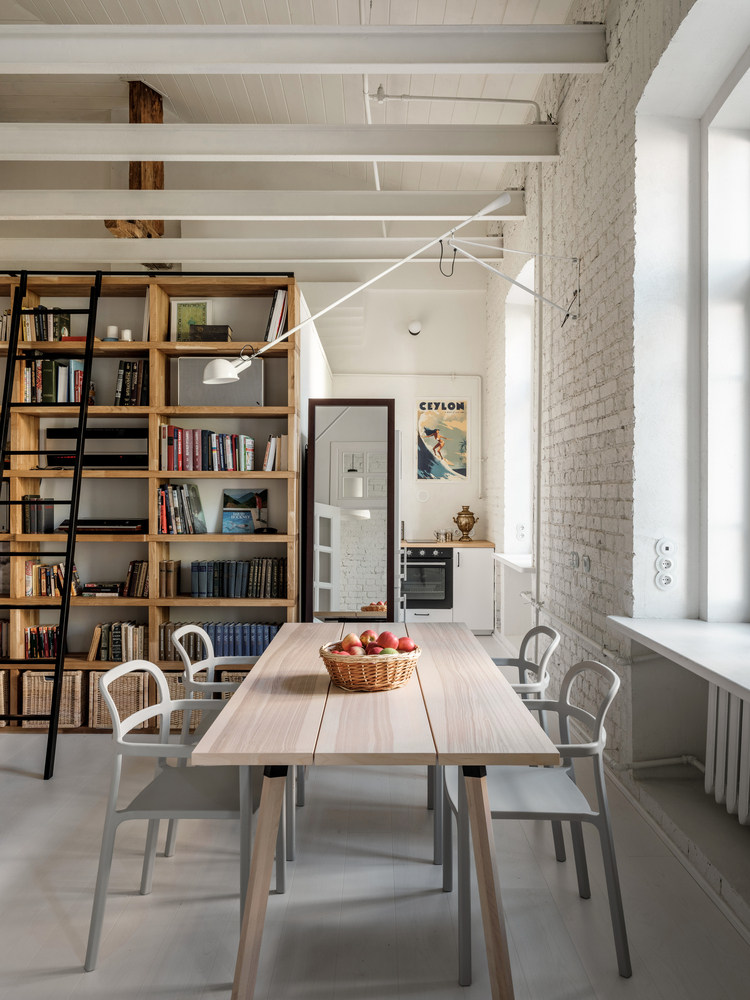
AM Apartment / TwoBo Arquitectura
TwoBo Aquitectura knew, embarking on this project, that stepping on 120 years of history can be risky business. Age and tradition bring with them a complex set of design problems, which can sometimes make change quite difficult. However, the idea of tearing down the existing building and starting from scratch seemed impertinent.

A compromise was reached in which TwoBo kept elements from the original construction, such as the nolla-tile mosaic floors, and the frames on the ceilings. To open up the interior space, partition walls were taken down. This process was embued with the rich study of cultural context that comes with stripping down layer upon layer of history until the original brick walls were unearthed.
The project was driven by the goal of finding a balance between two building approaches: the old way of cement and water hand-placed construction work, and the new way of dry construction based on oak frames and layers of painted wood. The old-fashioned method endures without becoming too weighty, while the new bricks are laid side by side with their predecessors.
Musico Iturbi / Roberto Di Donato Architecture
In 2017 Roberto Di Donato Architecture completed the challenging renovation of an apartment unit located in an early 20th century listed building in the heart of Valencia. After many years in a state of abandonment, the apartment was an empty shell when it was bought by the client, creating numerous opportunities but also challenges to the design team.
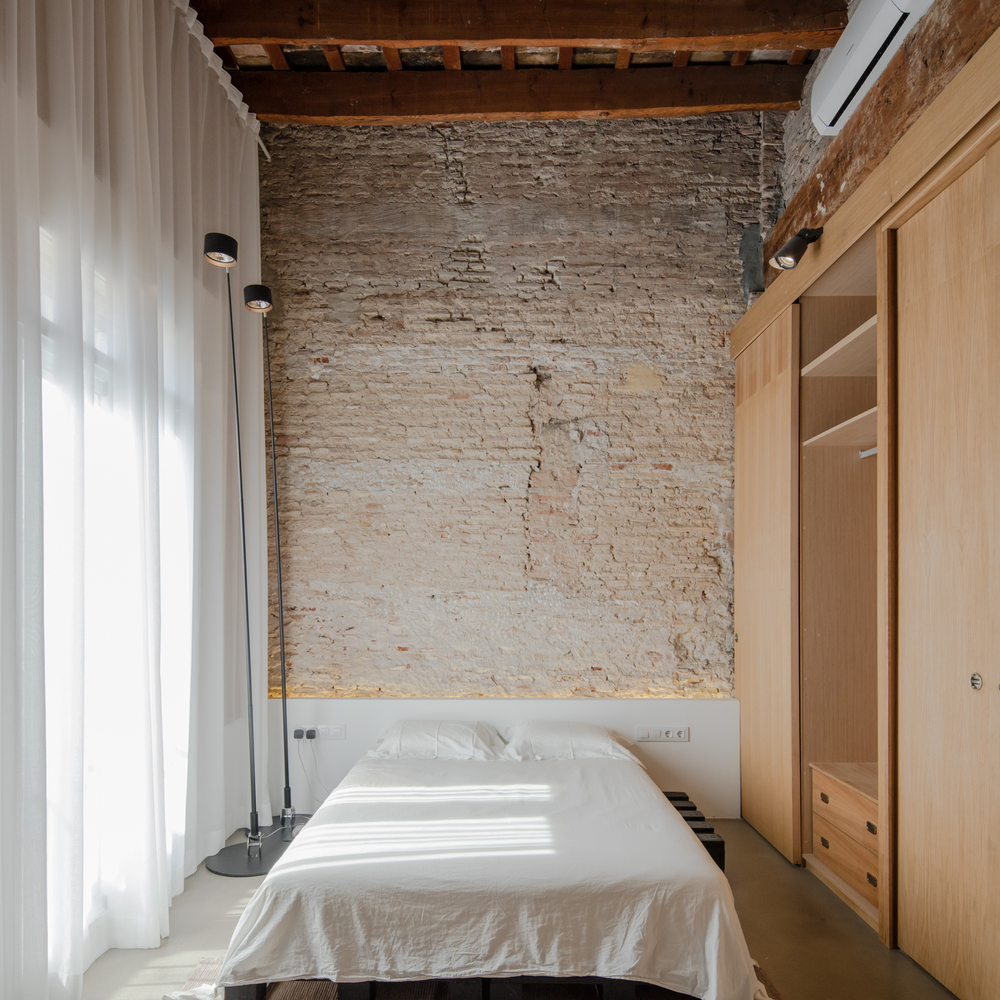
The approach to the project was guided by the ambition to create distinct, yet fluid, modern living spaces almost leaving undisturbed the existing structure. With a constant flow, the living space is divided between night and day areas provided by two tall wooden elements. These custom-designed elements also contain the bedroom wardrobes and three sets of doors which allow for varying degrees of privacy.
The ceiling height was deemed a particularly valuable element in the renovation. The structure of the roof was restored and kept fully exposed, underlining the respect for the past and also enabling a full perception of the space and volume of the apartment. All of the new construction elements were added to the design with a clear sense of direction. The wooden wardrobes, the full-height white curtains, and the tall ladder serve to accentuate the verticality of the space. In turn, the long kitchen worktop, the white plasterboard pedestal, and its line of light speak to the horizontal dimensions.

The project succeeded in introducing a contemporary design language, while enhancing the character and the materiality of the old space. By only adding essential new features, “wounds” and layers of transformations over the years were carefully retained and displayed to enhance the sense of continuity with the building’s history.
Vía Archdaily




